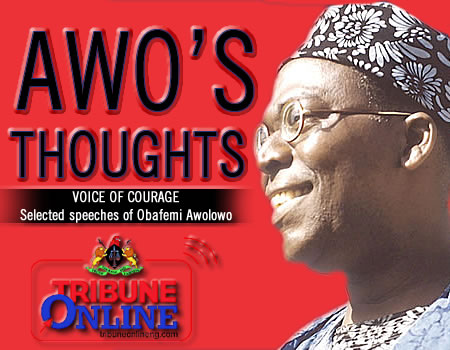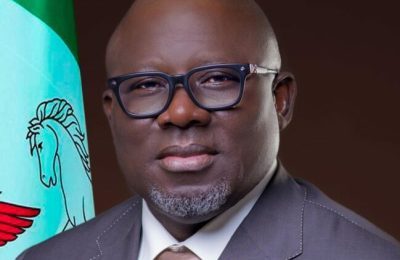CONTINUED FROM LAST WEEK
Speech given in the Western House of Assembly, Ibadan, on 16 July, 1952.
Now the provisions of this Part of the Bill will enable a local government council to acquire whatever land it may need for local government purposes compulsorily but compensation will be paid as is done by the Regional or Central Government. In case of a dispute as to the correct amount of compensation to be paid, an appeal will lie to the Supreme Court whose decision on the matter will be final.

Then Part XVIII deals only with legal proceedings, and Part XIX deals with a lot of miscellaneous matters some of which make provisions for the preservation of existing ‘rights which are vested in various Native Authorities.
Now having explained this Bill Part by Part, I will attempt to set out the criticisms which have been leveled at the Bill and the manner of its introduction. These criticisms may be summarized as follows:
- That the tier system, as distinct from the pyramid system, would tend to fragmentation and that the abolition of subordinate status would encourage a subordinate chief to snap his fingers at his superior chief and assert an independence which he did not enjoy by tradition.
- That by making Obas Presidents only, an attempt is being made to put into obscurity the institution of monarchy in the Western Region with a view to its eventual abolition, by subtle means.
- That the creation of Local Government Inspectors and Assistant Local Government Inspectors in place of Residents and District officers was a ‘back door way’ of eliminating the latter and that such an elimination at this stage would lead to chaos.
- That sufficient publicity was not given to the provisions of this Bill and that our people have not been given an opportunity of studying and discussing the provisions of this Bill and submitting their opinions thereon to the Minister for Local Government. Mr. President, I will proceed to deal with these criticism in the order in which I have stated them.
In the first place the tier system does not lead to fragmentation nor does it adversely affect or cut asunder the traditional ties.

Under the present law, I am referring to the Native Authority Ordinance, a subordinate Native Authority is deemed to possess all the powers which a superior Native Authority possesses but the subordinate Native Authority cannot make any orders or rules or perform most of its functions without the consent of the superior Native Authority. Experience shows that this system leads to unnecessary delays, frustration and resentment on the part of the people who are subordinate to a superior Native Authority. Under the proposed law each Council, Divisional, District or Local, will have a number of specific functions vested in it, each council will enjoy complete autonomy and freedom of action. There is great flexibility in the provisions of this Bill and also extensive scope within which the Regional Authority could manoeuvre in giving functions to various councils.
As for the second criticism there is no intention whatsoever to derogate from the prestige and status of our monarchical institutions. On the contrary, we consider it to be in the best interests of the people of this Region that these institutions should be preserved. I must emphasise this point, however, that the lesson of history is that absolute monarchy or rigid adherence to the divine rights of kings provokes antagonism and bloody revolution while constitutional monarchy stimulates affection and respect in the minds of the people for their monarchical institution. If we are therefore anxious to preserve our monarchial institutions, and if our traditional rulers are keen that the institutions should continue to serve as rallying grounds for the local government activities of our people, then it is incumbent upon all of us to study the example of British monarchy and try to emulate that example in form, in spirit and in practice.
In the third place, Mr. President, it is not correct that we are seeking the total elimination of Administrative Officers at this stage of our local government development. As has been aptly and clearly stated in the Policy Paper of the party in power on local government, ‘the present structure, i.e., of local government, is made so strongly dependent on the Administrative Officers that it would be foolhardy to remove these props before other supports have been provided’. The party of which I have the honour of being the leader, I must say, Mr. President, is too realistic and practical to take any rash step that would invite confusion let alone chaos. It is however the aim of my party that Administrative Officers should be progressively eliminated from our local government activities within the next five years. Under the new law, Administrative Officers would I hope become, on secondment, Divisional Secretaries or what are now known as Administrative Secretaries. In this capacity they would be servants of the local government concerned. Many of them would be metamorphosed into Local Government and Assistant Local Government Inspectors. In this capacity they would cease to wield the powers which are at present vested in them under the Native Authority Ordinance. They would be reduced to the status of advisers and advisers only to these local government councils. On the other hand they would be the agents or the representatives of the Regional Government for the purposes of supervising the activities of Local Government and making regular reports thereon to the Regional Authority. Furthermore, as I said previously, the number of powers that may be delegated to them as and when the Regional Authority deems necessary will be negligible. In the fourth place, and finally, it is untrue to say that sufficient publicity has not been given to this proposed reform. During the electioneering campaign last year my party made a promise openly and persistently to the electorate that if they were given an opportunity of ruling this Region they would introduce certain reforms in local government in the Region. In that connection a Policy Paper was prepared on local government. This Policy Paper was published in all the newspapers excepting the Opposition papers and wide comments were made upon it.
And I must say, Mr. President, that the principle’ which was embodied in that Policy Paper which was published last year is in essence and substance the principle which underlies the present reform. Besides that, since April last, I have taken the trouble to tour the whole of the Western Region and to visit as many Native Authorities as it was physically possible for me to visit. Where I was unable to visit Native Authority Councils I have met Provincial Conferences consisting of accredited representatives of Native Authorities in the Province. I have addressed these Provincial Conferences and Local Authority Councils and have outlined the principle and the application of the present reform to these Councils and Conferences. Besides all these I have also caused to be to be issued, leaflets which were widely distributed not only to the Province but to various Native Authority Councils and to the people of this Region who can read at all at large. It is quite true that this Bill has not been widely publicised; but I must say emphatically to the discomfiture of those who have just cheered me that it would be a novel thing indeed for any government to give publicity to Bills in the same way as they give publicity to the principle which forms the basis of such Bills. The practice in civilised countries is, when occasion demands and when the principle underlying a particular legislative measure is novel and new, to publish it as a ‘White Paper’ or a ‘Sessional Paper’. Then when the principle in the ‘White Paper’ or ‘Sessional Paper’ has been thoroughly debated and sufficient publicity given to it, every attempt will then be made to send it to various people asking for their comments and recommendations.’ In this particular case, as I said before, the reform now proposed forms part of the basic platform on which we were elected into this House of Assembly and it is our duty in fulfillment of our promise to introduce the reform at the earliest possible time along the line which is contained in the Bill. Besides that, how many people ever read a Bill clause by ‘clause? In any event, Mr. President, the Government of this Region has a clear conscience that it has faithfully and conscientiously discharged its duty to the people of this Region in this respect. In conclusion, Mr. President, I commend to this House this veritable charter of freedom, that is, freedom at the local government level. The famous motto of my party is ‘Freedom for all; life more abundant’. I believe that the political aim of the Opposition could be accommodated within the wide ambit of the lofty ideals which are epitomized in this phrase. In April last year my party declared that it would work to attain self-Government for Nigeria within five years after the commencement of this new Constitution The party now in Opposition quickly followed our example by changing its well-known slogan’ Freedom in our life time’ – which is indefinite – to ‘Freedom in five years’. Are we really sincere in this declaration of freedom? I can speak for my party, and as an earnest of our sincerity and good faith we are, by means of this Bill, taking a definite and resolute step towards the attainment of our objective. And, by God, we are not going to look back. I cannot, however, speak for the Opposition. Are they sincere in their own declaration? Some people believe in freedom and act freedom, but others pretend to like freedom but are in reality slavish both in their minds and in their mentality. By their words, however, we shall know them, for it has been wisely and truly said by them of old that ‘from the abundance of the heart the mouth speaketh.’
CONTINUES NEXT WEEK
READ ALSO FROM NIGERIAN TRIBUNE






